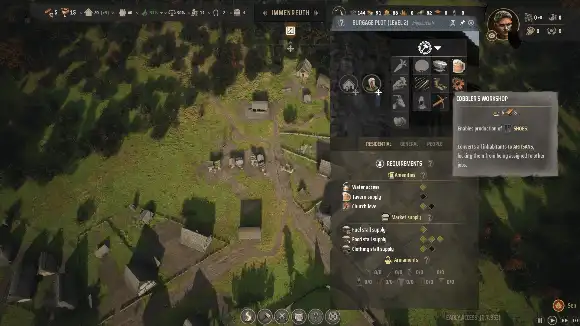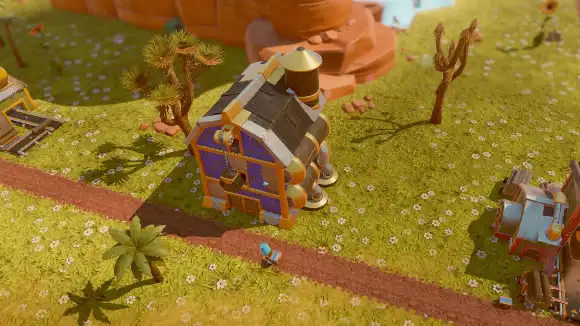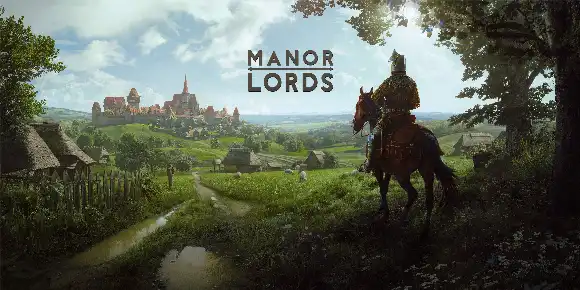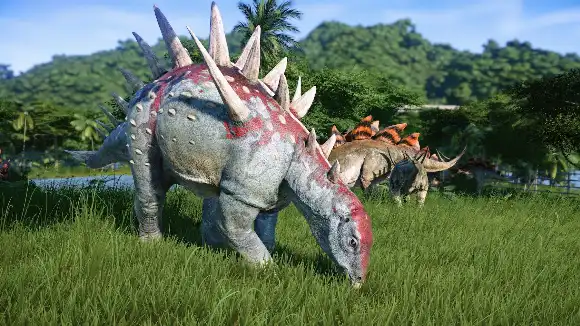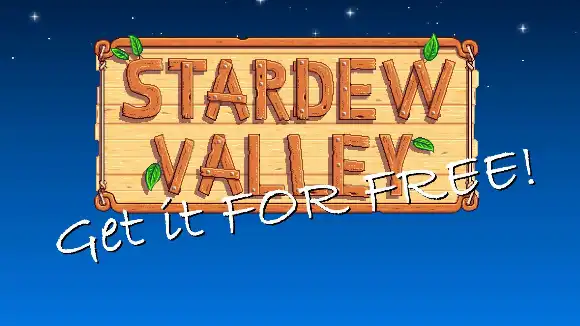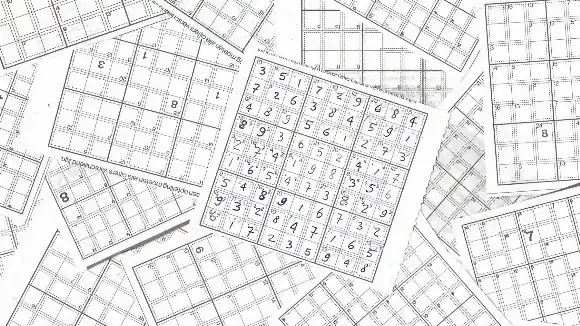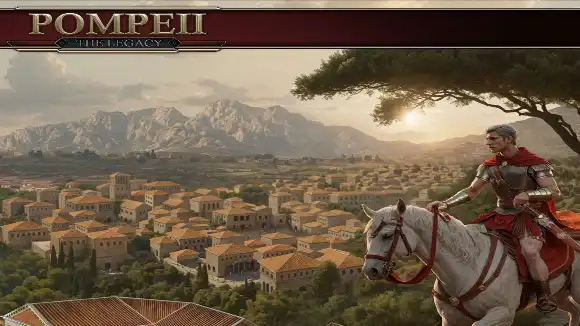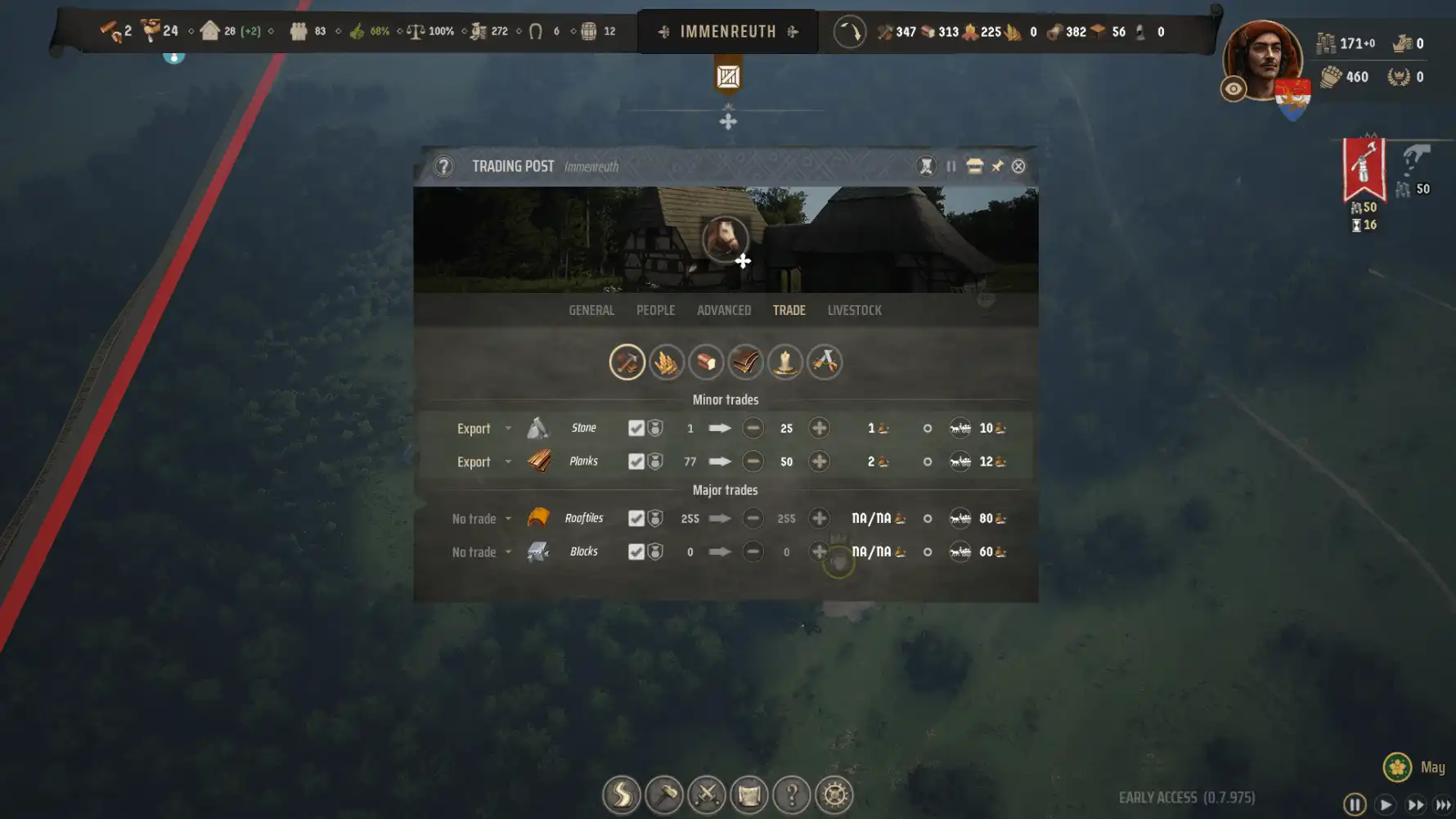
In this article
In every city builder, money plays a role one way or another.
The same is true for Manor Lords. Even though construction of buildings only requires available resources to be at hand, money is still needed.
Why do you need money?
First of all, money in Manor Lords is divided in 2 types. There is regional wealth and a personal treasury.
These two money types are disctinctly different. They are both acquired by other means as well as used for different purposes.
Regional Wealth
Every region has their own financial pants to hold up. This is the regional wealth.
Regional wealth is acquired in 3 ways:
- Selling goods by exporting / trading
- Burgage plots level 2 or higher
- One time payments when bandit camps are defeated
Regional wealth is needed for:
- Buying goods by importing / trading
- Extending Burgage plots with backyard extensions like vegetable farms or goat pens
- Taxing by the Manor
Personal Treasury
The personal treasury is your own wallet, so to speak.
It is not tied to a region, but to your being as a Manor Lord and mostly used for establishing your leadership.
Personal treasury is acquired in 2 ways:
- Taxing your region or regions from the Manor
- One time payments when bandit camps are defeated
Personal treasury is needed for:
- Hiring Mercenaries
- Hiring extra soldiers for your retinue
- Upgrading retinue soldiers' equipment
- Claiming new regions
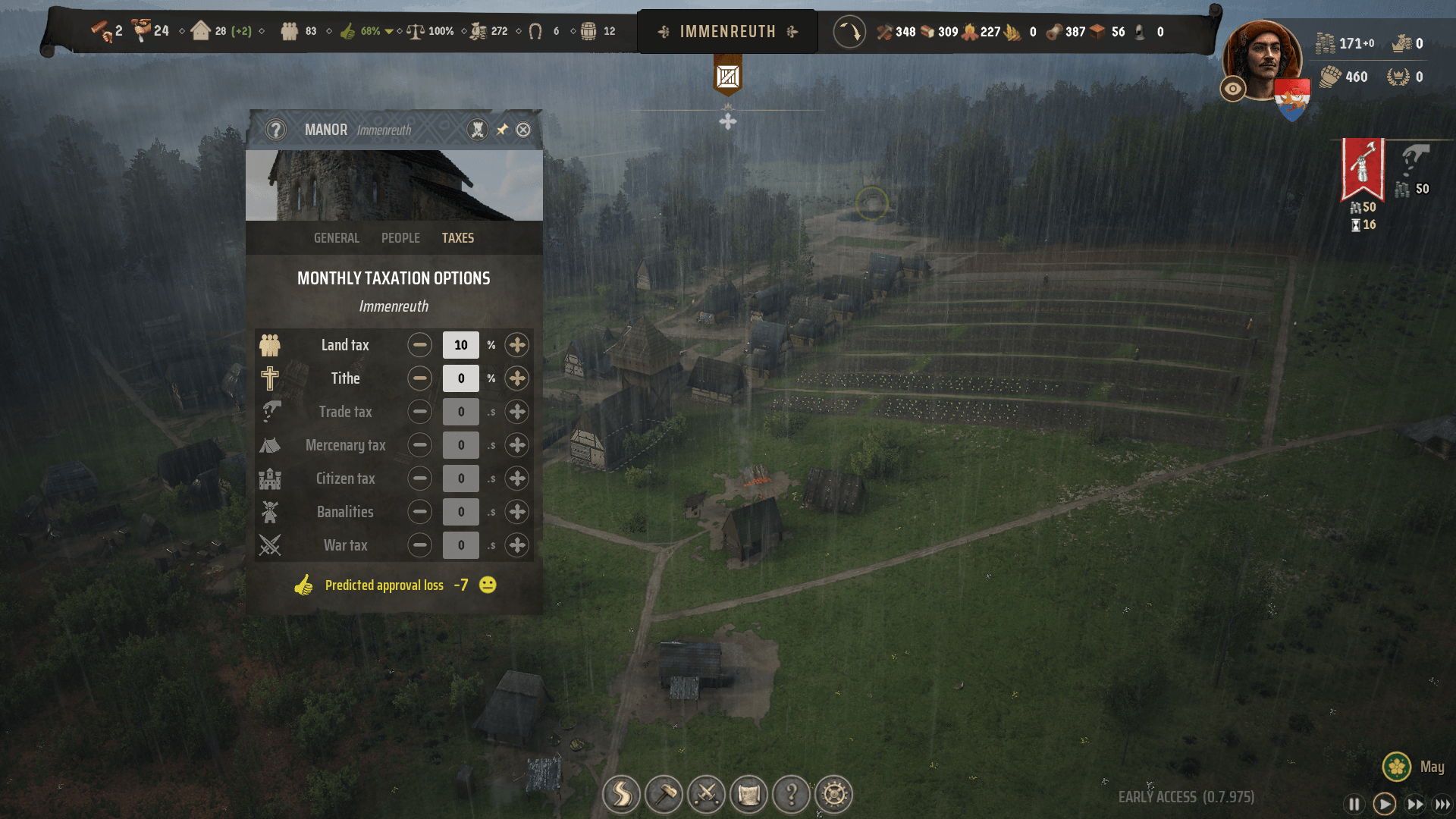
How to generate regional wealth early game
As mentioned, there are 3 ways to increase your regional wealth in Manor Lords. Of those 3, raiding bandit camps is not something you want to be doing early game and if you do, you'll want to use the spoils to line your own coffers.
That leaves the other 2 options viable to generate regional wealth.
- Selling goods by exporting / trading
- Burgage plots level 2 or higher
Selling goods by exporting / trading
Even though you might be struggling to stock up on food and fuel to make it through the winter, there are bound to be plenty of goods you can sell to free travelling merchants as or after the first year passes.
They are not the goods selling for lots of money a piece. Instead, we'll focus on the cheap materials that you will almost automatically gain aplenty, but never need all at once.
Things like:
- Stone, which is mined almost instantly, but only needed to upgrade Church and granary;
- Iron Slabs, if you don't intend to create weapons or armour in this region or have a rich resource;
- Planks, as the log:plank ratio is 1:5. From each tree you fell, 5 planks can be made. Even if you're expanding your settlement, you will have plenty of planks to sell;
- Clay and Roof tiles, depending on if you have a rich resource. Keep in mind upgrading Burgage plots to level 3 does cost 4 roof tiles per plot, so keep at least 100 to be able to upgrade 25 burgage plots to level 3;
- Berries and firewood, even though they're essential, having 20 months of stock might not be necessary...
To sell goods, you need to build a Trading Post and assign a family to it. Those people will gather the goods you select to export for you and sell them to traveling traders who wander the roads.
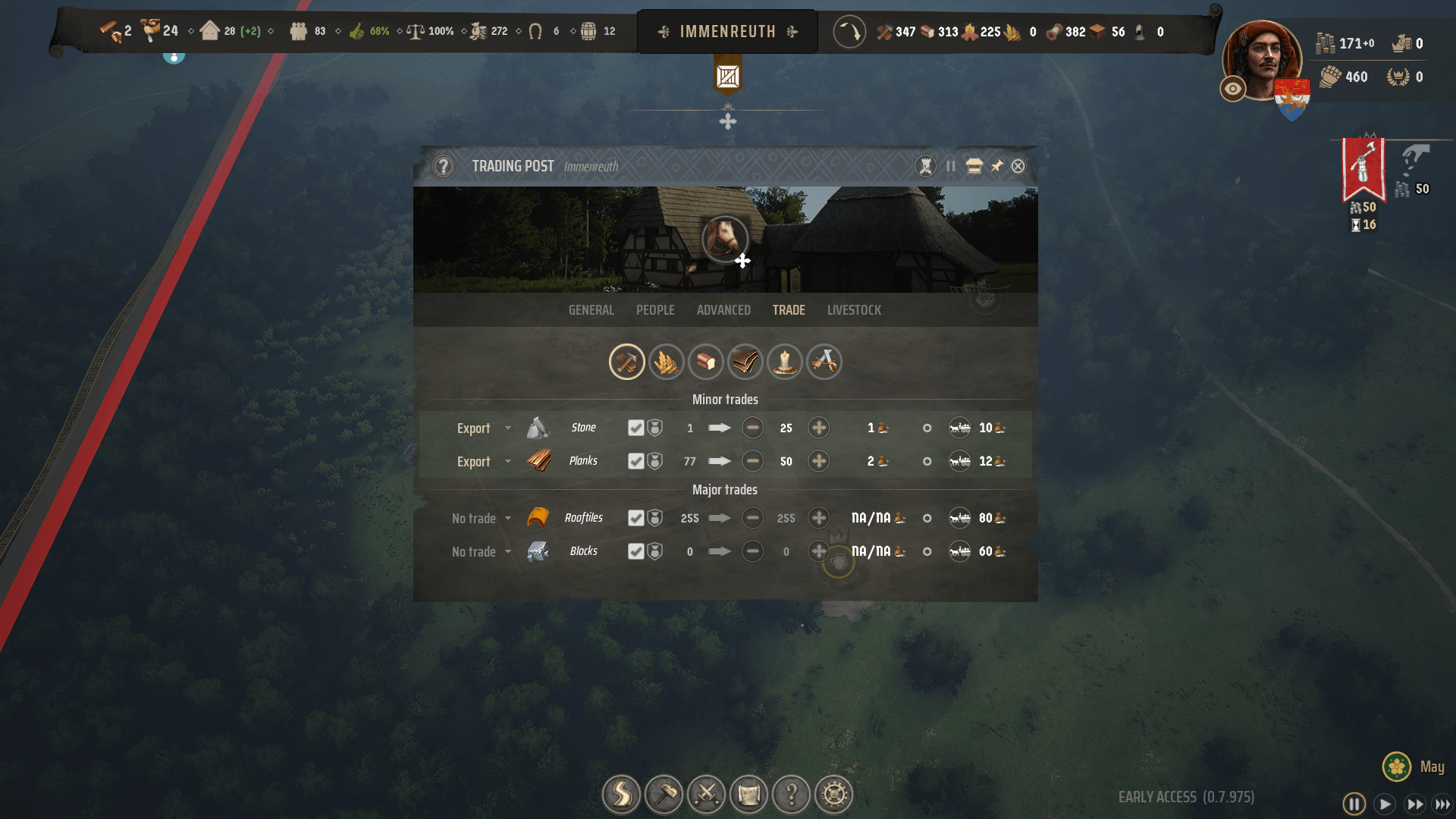
To set up goods for export, select the Trading Post and switch to the Trade tab. There, find the good you want to sell in the Minor trades section.
At the start of the line, select No trade and switch it to Export. Somewhere in the middle, in between the minus and plus sign, select the minimum amount of this good you want to keep.
In theory, this means traders will stop exporting this good as soon as it hits the limit you set. In practice, this only seems to work for importing, not exporting. Be sure to keep an eye on your stock levels if you want to keep some!
Minor trades versus major trades
In the Trading Post, you will see trades listed as either Minor trades or Major trades. For selling excess goods early game, you can pick any of the goods listed in the Minor trades section.
The difference between a Minor trade and Major trade, is that for every Major trade a specific trade route needs to be established.
Minor trades are conducted by free merchants. They trade those goods without limits, but you depend on their arrival at whim and their carrying capacity. These are limitations to keep in mind.
Whenever you pay money and establish a Trade route, Major trades are performed by dedicated merchants who will regulary visit your region. They will only trade the selected type of good. This means higher quantities at higher frequency.
You can open up a trade route for Minor trades as well. It is not required, but will remove the limitations.
Keep in mind: establishing trade routes will cost money. The higher the item price, the more expensive it will be to open up the route. This money is deducted from the regional wealth.
Burgage plots level 2 or higher
The second way to generate a small, but steady income early game, is by upgrading your Burgage Plots.
At level 2, each Burgage Plot will generate 1 regional wealth per month.
To upgrade a Burgage Plot from level 1 to level 2, the requirements aren't hard to meet. The essentials (water, faith and fuel) are supplied by a well, Church and a Woodcutter's Lodge.
The trickiest part is the 2 different types of food. It requires a little timing, but having both a Forager Hut and a Hunting Lodge active at the same time will do the trick.
That leaves the clothing requirement. Lucky for you, Hunting Lodges don't only produce meet, but also hides. A Tannery can make Leather from Hides, which will make you meet the clothing requirement.
Once upgrade to level 2, it doesn't matter if you keep those requirements met. Sure, people won't be overly excited any more, but they will still pay you!
Once upgraded to level 3, each Burgage Plot will generate 2 regional wealth per month. But once you're there, it's not really early game any more.
